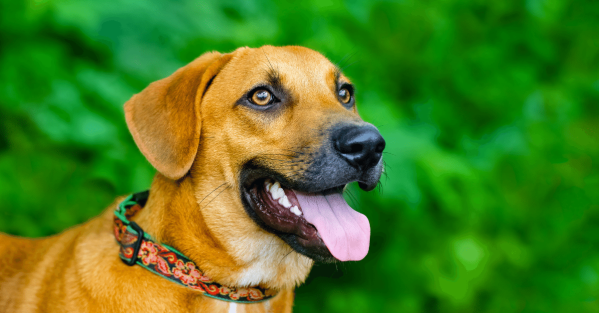It's an image you see often: a dog with his mouth ajar, tongue waving. One of the most signature characteristics of a dog is panting (followed closely by tail-wagging). While panting is a normal part of a dog’s day, heavy panting or panting all the time could be a sign of something more serious. So if you're wondering why your dog is panting, this is for you.
Read on to understand why your dog may be panting, how to spot the difference between normal and heavy panting, and what to do if your pup is experiencing the latter.
Reasons Your Dog Is Panting
If you're wondering why your dog is panting, there could be a few different reasons.
They’re hot or overheated
The usual reason dogs pant is to cool themselves down. Pups don’t sweat like us (their fur won’t allow it), so panting is their main way to keep themselves from overheating. Sometimes, however, panting isn’t enough to keep a dog's cool. In these cases, your dog may become overheated, which is a serious medical issue.
If your dog’s panting is heavier than usual and they also have trouble breathing, pale or dry gums, or an erratic, rapid pulse — especially if they’ve been in a hot car or in warm weather — they may be suffering from heatstroke.
They’re stressed or anxious
If your pup is panting and it isn’t hot out or they haven’t exerted themselves recently, they could be panting for behavioral reasons. "Just like humans tend to sweat when they’re nervous, so do dogs pant to help release that energy," Dr. Deirdre Frey, founder of the house call veterinary practice Vet At Your Door explains. When a dog is stressed or anxious, panting is usually happening along with other systems, such as shaking, repetitive yawning, licking lips, and pacing. Triggering events like car rides, vet visits, or fireworks are often the cause of this type of panting.
They’re in pain
Dogs can also pant when they’re hurting. If your pup is panting at times where there doesn’t seem to be an external cause, it might be because your dog is in pain.
They have an underlying illness or condition
"When a dog is ill, electrolyte shifts can occur," explains Dr. Frey. “Breathing off more carbon dioxide can help those shifts to normalize again." Some conditions and illness that can cause panting like this are obesity, Cushing’s disease or certain heart problems.
Their anatomy makes breathing difficult
Dogs with squished snouts (think bulldogs, shih tzus or pugs) may also pant a lot because their airway is constricted. This condition — called brachycephalic obstructive airway syndrome (BOAS) — causes dogs to pant more and also less efficiently, making them more prone to heatstroke.
The Difference Between Normal & Heavy Panting
Heavy panting tends to sound louder and harsher than regular panting and often comes with other symptoms, such as shaking or whining. You know your pup, and likely know what their normal panting sounds and looks like. Anything that seems more intense or severe warrants closer attention.
When To Talk To A Vet About Your Dog's Panting
If your pet is panting heavily at times when they clearly are not trying to cool themselves off or if you think they’re in pain or they have other symptoms like purple gums (a sign they’re not getting enough oxygen), you should take them to the vet immediately.
Once at the vet, you will be asked questions about the circumstances around your dog’s panting, such as where/when it happens, and whether there are other symptoms. With that information and after a physical examination, your vet will determine the likely underlying causes for your dog and provide the best treatment.
How To Help Your Dog's Panting
Treating your dog's panting will rely on determining what the cause of it is. Here's how to help your dog's panting in more specific situations.
If it's anxiety...
If your dog is panting because they’re anxious, and the anxiety is extending to a specific event like fireworks or driving in the car, you can try to limit the times they’re exposed or get medication from your vet to help with your pup’s anxiety.
If it's overheating...
Overheating is a medical emergency — if your dog has heavy panting combined with glassy eyes, drooling, an elevated heart rate, vomiting or diarrhea, take steps to cool them down immediately. This includes moving your pup to a cooler spot, immersing them in cold water or applying ice packs to their neck, chest and head, and giving them ice cubes to lick. Once they’ve cooled down a bit, take them to the vet immediately. The best way to deal with heatstroke, of course, is to prevent it — make sure never to leave your pup in a parked car and make sure they have access to cool areas at home.
Panting is part of a dog’s life, and by extension, your life as well! Panting is also a way for you to notice if something’s not quite right with your pup, whether they’re anxious or suffering from some underlying condition. Now that you know the signs to look for, however, you’ll be able to tell when your dog is just cooling off or whether there’s something else going on.
